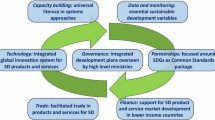Abstract
This paper applies the theory of social situations to study whether international environmental agreements (IEAs), mainly those on greenhouse gas emission reductions, can be attained. A game theoretic model is generally a black box for decision makers, where the mechanisms, which lead to solution(s) of the game, are not explicitly pointed out. This paper opens this black box by making the (institutional) move rules explicit. The usual pessimistic outcome with an ineffective and small size of stable coalitions among world regions is countered. Our model challenges conventional wisdom in the sense that large coalitions are possible outcomes of the cartel game, namely by incorporating: (1) farsightedness, and (2) coalitional moves with commitment as an alternative to myopic and individual moves which characterise the cartel game. We show that even if the international negotiations on climate change mitigation are modelled as an n-person prisoner's dilemma, one cannot rule out cooperation among world regions as a solution of the game. Indeed, in most analysed situations the grand coalition is among the solutions of the game. This shows that predictions based on cartel stability may be too pessimistic if it comes to analysing incentives to cooperate in implementing international environmental policy. Moreover, in an empirically calibrated model, we find three out of six instances where Russia (with or without the US) has an incentive to sign the Kyoto protocol.
Similar content being viewed by others
References
Barrett, S. (1994), ‘Self-Enforcing International Environmental Agreements’, Oxford Economic Papers 46, 878–894.
Barrett, S. (1998), ‘On the Theory and Diplomacy of Environmental Treaty-making’, Environmental and Resource Economics 11, 317–333.
Barrett, S. (1999a), ‘The Credibility of Trade Sanctions in International Environmental Agreements’, in P. Fredriksson ed., Trade, Global Policy, and the Environment, World Bank Discussion Paper No. 402, pp. 161–172.
Barrett, S. (1999b), ‘A Theory of Full International Cooperation’, Journal of Theoretical Politics 11, 519–541.
Bernheim, D., B. Peleg and M. D. Whinston (1987), ‘Coalition-Proof Nash Equilibria I. Concepts’, Journal of Economic Theory 42, 1–12.
Botteon, M. and C. Carraro (1997), ‘Burden-sharing and Coalition Stability in Environmental Negotiations with Asymmetric Countries’, in C. Carraro ed., International Environmental Negotiations, Strategic Policy Issues (pp. 26–55). Cheltenham: Edward Elgar.
Botteon, M. and C. Carraro (1998), ‘Strategies for Environmental Negotiations: Issue Linkage with Heterogeneous Countries’, in N. Hanley and H. Folmer eds., Game Theory and the Environment (pp. 181–203). Cheltenham: Edward Elgar.
Carraro, C. (1999), ‘The Structure of International Agreements on Climate Change’, in C. Carraro ed., International Environmental Agreements on Climate Change. Dordrecht: Kluwer Academic Publishers.
Carraro, C. and C. Marchiori (2003), ‘Stable Coalitions’, Chapter 5, in C. Carraro ed., The Endogenous Formation of Economic Coalitions, Cheltenham: Edward Elgar.
Carraro, C. and D. Siniscalco (1993), ‘Strategies for the International Protection of the Environment’, Journal of Public Economics 52, 309–328.
Cesar, H. (1994), Control and Game Models of the Greenhouse Effect. Berlin: Springer-Verlag.
Chwe, M. S. Y. (1994), ‘Farsighted Coalitional Stability’, Journal of Economic Theory 63, 299–325.
Courtois, P., J. C. Péeau and T. Tazdaït (2001), ‘An Evolutionary Approach to the Climate Change Negotiation Game, Nota di lavoro 81. 2001'. Available from: http://www.feem.it.
D'Aspremont, C., A. Jacquemin, J. J. Gabszewicz and J. Weymark (1983), ‘On the Stability of Collusive Price Leadership’, Canadian Journal of Economics 16, 17–25.
DeMarzo, P. M. (1992), ‘Coalition, Leadership and Social Norms: The Power of Suggestion in Games’, Games and Economic Behaviour 4, 72–100.
Ecchia, G. and M. Mariotti (1998), ‘Coalition Formation in International Environmental Agreements and the Role of Institutions’, European Economic Review 42, 573–582.
Eyckmans, J. (2001), ‘On the Farsighted Stability of the Kyoto Protocol, ETE Working Paper 2001–2003’ (also available as: CLIMNEG Working Paper 40).
Finus, M. and B. Rundshagen (1998), ‘Renegotiation-proof Equilibria in a Global Emission Game when Players are Impatient’, Environmental and Resource Economics 12, 275–306.
Greenberg, J. (1990), The Theory of Social Situations, an Alternative Game-theoretic Approach. Cambridge: Cambridge University press.
Hanley, N. and H. Folmer eds. (1998), Game Theory and the Environment. Cheltenham: Edward Elgar.
IPCC (2000), Presentation of Robert T. Watson, Chair, Intergovernmental Panel on Climate Change at the Sixth Conference of Parties to the United Nations Framework Convention on Climate Change, November 13, 2000, http://www.ipcc.ch/press/sp-cop6.htm.
Kemfert, C. (2002), ‘An Integrated Assessment Model of Economy-Energy-Climate-the Model WIAGEM’, Integrated assessment 3(4): 3281–298.
Kemfert, C. (2004), ‘Climate Coalitions and International Trade: Assessment of Cooperation Incentives by Issue Linkage’, Energy policy 32, 455–465.
Lise, W., R. S. J. Tol and B. Van der Zwaan (2001), ‘Negotiating Climate Change as a Social Situation’, Nota di lavoro 44. 2001, FEEM, Milan.
Mariotti, M. (1997), ‘A Model of Agreements in Strategic Form Games’, Journal of Economic Theory 74, 196–217.
Markandya, A. (2003), ‘The Influence of Climate Change Considerations on Energy Policy: The Case of Russia’, Paper presented at the EAERE conference in Bilbao. Paper available from: http://www.gruponahise.com/eaere2003/PAPER_8/8E_3MARK.doc.
Na, S. and H. S. Shin (1998), ‘International Environmental Agreements Under Uncertainty’, Oxford Economic Papers 50, 173–185.
Nakanishi, N. (1999), ‘Reexamination of the International Export Quota Game Through the Theory of Social Situations’, Games and Economic Behaviour 27, 132–152.
Smith, J. B., H.-J. Schellnhuber, M. Q. Mirza and others (2001), ‘Synthesis’, Third Assessment Report of Working Group 3 of the Intergovernmental Panel on Climate Change. Cambridge, UK: Cambridge University Press.
Ulph and Maddison (1997), ‘Uncertainty, Learning and International Environmental Policy Coordination’, Environmental and Resource Economics 9, 451–466.
Author information
Authors and Affiliations
Rights and permissions
About this article
Cite this article
Lise, W., Tol, R.S. Attainability of International Environmental Agreements as a Social Situation. International Environmental Agreements: Politics, Law and Economics 4, 253–277 (2004). https://doi.org/10.1007/s10784-004-1155-6
Issue Date:
DOI: https://doi.org/10.1007/s10784-004-1155-6




